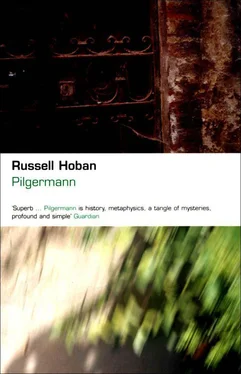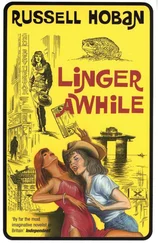Russell Hoban - Pilgermann
Здесь есть возможность читать онлайн «Russell Hoban - Pilgermann» весь текст электронной книги совершенно бесплатно (целиком полную версию без сокращений). В некоторых случаях можно слушать аудио, скачать через торрент в формате fb2 и присутствует краткое содержание. Год выпуска: 2002, Издательство: Bloomsbury Publishing PLC, Жанр: Современная проза, на английском языке. Описание произведения, (предисловие) а так же отзывы посетителей доступны на портале библиотеки ЛибКат.
- Название:Pilgermann
- Автор:
- Издательство:Bloomsbury Publishing PLC
- Жанр:
- Год:2002
- ISBN:нет данных
- Рейтинг книги:5 / 5. Голосов: 1
-
Избранное:Добавить в избранное
- Отзывы:
-
Ваша оценка:
- 100
- 1
- 2
- 3
- 4
- 5
Pilgermann: краткое содержание, описание и аннотация
Предлагаем к чтению аннотацию, описание, краткое содержание или предисловие (зависит от того, что написал сам автор книги «Pilgermann»). Если вы не нашли необходимую информацию о книге — напишите в комментариях, мы постараемся отыскать её.
Pilgermann — читать онлайн бесплатно полную книгу (весь текст) целиком
Ниже представлен текст книги, разбитый по страницам. Система сохранения места последней прочитанной страницы, позволяет с удобством читать онлайн бесплатно книгу «Pilgermann», без необходимости каждый раз заново искать на чём Вы остановились. Поставьте закладку, и сможете в любой момент перейти на страницу, на которой закончили чтение.
Интервал:
Закладка:
The fabric of the world being made as much of dreams and visions as it is of earth and stone, these virtual dreams of Unguent and these actual visions of Bosch centuries after my time are as real as anything else in my pilgrimage: they are as real as the castle on the mountain, as real as the gibbet at the crossroads where the crows flap cawing from the hanged men as I pass, as real as the wolves of the forest that drift like grey ghosts among the trees; the village dogs that guard the dust of the street and bark as I pass; the women at the well; the men outside the inn; the pigeons circling the pantiled roofs; the peasants in the fields; the signpost under a grey sky on the heath. By this same signpost will pass Bosch’s gaunt wayfarer of the ‘Haywagon’ triptych, will pass Schubert’s heartbroken young winter traveller; there is only one road for all.
Like the crows flapping up from the hanged men my thoughts scatter and like the crows they return to what they were feeding on. This is a good comparison because for the crows there is life to be got from death and for me there is the life of my present state arising from the death of my past one. If I had my proper parts I’d not be on this road; that’s a simple truth, not to be argued with. Had I my proper parts I’d still be prescribing for my patients or sitting cross-legged with my cloth and my needle, plying my trade and in my free hours finding what pleasure I could in life. Climbing that ladder is what I’d be doing as often as I had the chance. But how long could that have continued, my garden of Eden? Even God had to put Adam and Eve on the road before he could get on with the story. Thinking, thinking, and I can’t think how I could have gone on living without coming on this pilgrimage, without being as I am being now. When I had my proper parts I must have been blind and deaf, the world had not come alive for me, I had never talked with Christ, had never put my feet into the footsteps of my road away, had never, alone in a dark wood, seen the light of Now. So, Pilgermann, let your heart have balls, and on to Jerusalem.
Under the sun, under the rain I trudged on. On the bank of the river I saw a man hanging a bear from a tree. Not bear meat but a whole live bear. He was hanging it with a rope passed over a branch and a hangman’s noose on the end of it the same as if he were hanging a man. A big brown bear and it was coughing and moaning as its own weight slowly strangled it. The man was lean and ragged, his beard was full of twigs and leaves and rubbish, it looked as if it might have birds nesting in it. As he braced himself with his feet against the trunk of the tree and pulled on the rope he cried, ‘My God, my God, why hast thou forsaken me!’
Before I could think what I was doing I had cut the rope with the knife given me by the second Sophia. The bear crashed to the ground and lay there without moving. The man turned on me in a fury. ‘You murdering fool!’ he screamed, ‘You’ve killed God!’
I said, ‘I didn’t mean to kill him.’
‘But you have killed him!’ he said. ‘God was everything to me, he was big and strong and shaggy, he was like a bear.’
‘He was a bear,’ I said.
‘Of course he was,’ said the man. ‘God can be whatever he likes, completely and divinely; he always used to find me honey trees. And you’ve killed him, you’ve killed God.’ There were a bow and arrows and a hunter’s pouch lying on the ground; he picked up the bow and fitted an arrow to the string, aiming it at me. At this moment the bear stood up on his hind legs. He began to low and grunt, making gestures with his paws like a man making a speech.
‘Lies!’ shouted the man. ‘Lies, lies, all lies!’ He aimed his arrow at the bear.
The bear made a few more remarks; he put one paw over his heart and shook his head sadly, then he made a gesture clearly expressing that everything was over between him and the man. What a wonderful bear that was! How I wished that I could have him for a friend, what a travelling companion he would be — he clearly had a profound understanding and was one of those people who know when to talk and when to be quiet. While I was thinking this he dropped on to all fours and hurried off towards the trees. The man swung round to loose his arrow, I threw out my hand to knock him off his aim but there fell across my arm something as hard and heavy as an iron bar, a blackness came in front of my eyes and I fell down.
When I came to myself the bear, shot full of arrows, was lying dead and the man was sitting on the ground throwing dirt on his own head and crying, ‘O my God, my God, why hast thou forsaken me!’
I said, ‘Don’t be such a fool, he hasn’t forsaken you — you’ve killed him.’
He said, ‘I killed him because he forsook me.’
I said, ‘How did he forsake you?’
He said, ‘He wouldn’t show me any more honey trees.’ He sat there rocking to and fro in his grief. It was that sort of a hot still day when one seems particularly to hear the buzzing of flies. I left him to his lamentations and went on my way.
I was thinking about the bear, how good it would have been to have him with me, how I should have heard the padding of his feet and seen out of the corner of my eye his shaggy brown back rocking along beside me through the long miles. Big and strong he was too, a match for half a dozen men in a fight; one would feel easy anywhere with such a friend. Perhaps he might even have danced a little now and then for our supper and a night’s lodging. Pilgermann and his bear would have become famous on the pilgrim road.
There was a low chuckle in my ear and a hard hand clapped me on the shoulder in great good fellowship. It was that bony personage who had been riding his horse in the wood where the headless body of the tax-collector was hanging from the tree. This time he was on foot; he was dressed as a monk and like me he carried a pilgrim’s staff. It was very shadowy under his hood, one couldn’t properly say that there were eyes in the eyeholes of his skull-face but there was definitely a look fixed upon me; it was that peculiarly attentive sidelong look seen in self-portraits.
‘Am I a mirror in which you see yourself?’ I said.
‘Everybody is,’ he said. ‘I am so infinitely varied that I never tire of myself. Mortals looking in a mirror see only me but I see all the faces that ever were and I love myself in all of them.’
‘You think well of yourself!’ I said.
He hugged himself in a transport of self-delight. ‘When I say, “Sleep with me!” nobody says no,’ he said. ‘Kings and queens, I have them all, no inch of them is forbidden to me; nuns and popes, ah! There’s good loving! I am the world’s great lover, that’s a simple fact though I say it myself. Well, there’s no need for me to blow my own trumpet — you’ll see when you sleep with me.’
He kept turning his face to me as he spoke, and his breath did not reek of corruption as one might suppose: it was like the morning wind by the sea. ‘Call me Bruder Pförtner,’ he said, ‘it’s a name I fancy: Brother Gatekeeper. It has a kind of monastic humility but at the same time it goes with a swing.’
‘Bruder Pförtner,’ I said. I thought about the gates he kept.
‘You’ve no idea,’ he said. ‘No idea at all.’ He made a graceful gesture and there opened upon my vision the brilliant lucent purple-blue of the crystalline vibrations of Now. His arm swept back, the gate was closed, the day seemed dark. We went on a little way in silence. His face was looking straight ahead and I saw only his cowl moving companionably beside me. ‘You know why I was chuckling when I first appeared to you?’ he said.
‘Why?’ I said.
‘I was chuckling at your bear thoughts,’ he said. ‘Really, you’re no better than that other fellow, you know. Had the bear been your friend you’d not have been content to let him be, you’d have had him dancing for your supper, and you with all that money on you. That’s how people are: they’re trade-minded, they can’t let anything be simply what it is. It was I that knocked your arm down when you tried to stop that fellow from shooting the bear.’
Читать дальшеИнтервал:
Закладка:
Похожие книги на «Pilgermann»
Представляем Вашему вниманию похожие книги на «Pilgermann» списком для выбора. Мы отобрали схожую по названию и смыслу литературу в надежде предоставить читателям больше вариантов отыскать новые, интересные, ещё непрочитанные произведения.
Обсуждение, отзывы о книге «Pilgermann» и просто собственные мнения читателей. Оставьте ваши комментарии, напишите, что Вы думаете о произведении, его смысле или главных героях. Укажите что конкретно понравилось, а что нет, и почему Вы так считаете.












